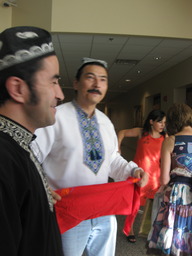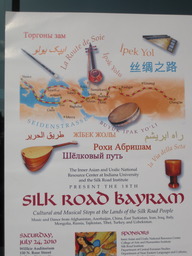
Uyghur Teachers Dress
Up for Silk Road Bayram
 Uyghur Teachers Dress Up for Silk Road Bayram |
e{|---------------------------|-----------------------------------|
B{|---0-------1-------3-------|---12----12--12----12----12--12----|
G{|-------0-------0-------0---|-------0-------0-------0-------0---|
D{|---------------------------|-----------------------------------|
A{|-----------0-------2-------|---10------10------10------10------|
E{|---3-----------------------|-----------------------------------|
Even at 10:00 P.M., the weather still felt too hot and sticky. I had planned to go inside the cafe to sit in the cool air-conditioning. Instead, I opted for a spot out on the porch: to be near the musicians.
My reason for coming to the Runcible Spoon Cafe had been to sit somewhere cool, to be somewhere I could study comfortably for a couple hours. But, when I stepped off the street and entered the cafe courtyard, what I first heard--then saw--changed my mind. People were informally gathered together playing music on Middle Eastern instruments, singing along in various languages. I chose a table outside, sat down, and pulled out my homework.
I neglected my essay composition as the musicians continued playing traditional song after song. I recognized a few of the stringed instruments: one man was strumming a rabab, another an oud. A violinist wouldn't have ordinarily appeared out-of-place with this set--but for that she was a blonde, blue-eyed young woman playing along with men with more typically Middle Eastern features. Contrast-or-not to the beards and dark features she was accompanying, the sounds she was coaxing out of her violin harmonized perfectly. A tamborine rounded out the instruments being played.
I couldn't understand most of the lyrics, but could--to a degree--identify what I was listening to. The men, who were doing most of the singing, changed language from song to song. Occasionally they would sing in some Iranian language, other times in some Turkic language. I could pick out a lot words, especially those similar to words I know from Uyghur. But, my abilities were far from good enough to even be certain which language every piece was sung in. Was this song in Farsi--or was it Dari? Was the next in Azeri--or was it Turkish? Whichever languages they were singing in, it all sounded beautiful. From my table across the courtyard I nodded along in time, making little progress with my homework.
Approaching midnight, the man who had been playing rabab stood up, made his excuses, and left the courtyard. His departure seemed to leave the others at a loss as to what they should play next. The violinist turned to the person seated next to her, a student who had a guitar in his lap but had largely been quiet throughout the evening.
"I could sing now," she proposed. "How about 'Blackbird'? I know all the lyrics, do you know the guitar part?"
"'Blackbird'? I don't think I've heard of that one. Sorry," the guitar player answered. For the first time since I'd arrived at the cafe that evening the music went silent.
 Poster Announcing Music Concert |
Given their level of accomplishment in eastern music, I further doubted that whatever song the violinist knew as "Blackbird" would be the same finger-picked Beatles tune I learnt to play back in high-school. In all likelihood, I reasoned, the song she was talking about was a traditional melody from some part of Asia, sung in some language other than English. I remained up on the porch just off the courtyard, still unable to focus on my studies.
Violin resting on her knee, she prodded her classmate holding his guitar. "Oh, it's a beautiful tune." She broke into a soprano an octave higher than the version I knew:
"Blackbird singing in the dead of night... ".
The guitar player still didn't recognize the song. After singing a couple verses the musicians again went silent.
I got up from my chair and stepped over to their table.
"Excuse me. Are you looking for somebody who can play 'Blackbird' on guitar? I might be able to fake it... ".
The oud player (who I already knew from the concert program was an IU professor and instructor of Azeri language) got excited: "Yeah! Oh, that's how it should be! Come on over," he exclaimed. "Do you want to play the steel-stringed guitar or that nylon-stringed guitar on the amp?"
"Uh... I don't know. Either? It's been awhile since I last played any guitar at all," I confessed.
"Well, then this guy must really know how to play!", he smiled and nodded to the grad students. "Here," he offered me the nylon-stringed guitar.
I strummed an A-minor chord, then a D, then a G to see if the instrument was more-or-less in tune. It was.
I plucked out the opening chords to the song. The violinist needed no cue to come right in, singing out in her high, beautiful voice:
"Blackbird singing in the dead of night... ".
We finished the piece to a round of applause from the few tables yet occupied in the courtyard. The cafe had closed long before but nobody minded if we kept playing outside. We continued on, improvising what songs I could play from memory with those they knew well enough to sing along: A few more acoustic pieces by the Beatles. The Simon and Garfunkel arrangement of "Scarborough Fair". My fingers remembered chord progressions and arpeggios learned years ago; we used my iPod to look lyrics up on-line when the singers accompanying me weren't certain.
"So, what are you doing in Bloomington?", I asked the oud-player. He had picked up the tamborine at some point to accompany as I played. Partly I was just making conversation with him, but I also wanted to take a break from playing. I had seldom played music together with others.
"I teach Azeri at IU. What are you doing here?"
"I'm just here for another week or so," I said. Knowing he could speak Azeri--a Turkic language--I figured he could also understand Uyghur so changed the conversation out of English: "I came for the summer language program. I'm studying Uyghur."
He took the cue and replied in Uzbek. We continued on speaking that way (my version of Uyghur to his version of Uzbek) for some time. At some point, the violinist and I began to chat. We quickly found that we had both spent recent years studying in far-western China. While my time was mostly in Xinjiang, hers was right next-door in Tibet. We fell into Mandarin for the rest of our conversation.
It was coming up on 1:00 A.M.. They asked me to play another piece. I had exhausted what repertoire we had in common, so concluded with an encore take of Blackbird, the violinist again singing along. Things were picking up again. More people holding musical instruments had been dribbling back into the courtyard after the cafe closed; somebody announced they were about to perform another traditional Middle Eastern piece. I wanted to stay to listen. The energy was good. I wasn't noticing the sticky heat anymore. I had long-since decided there was no point in doing my homework. The natural thing to do would have been to stay and extend the moment.
Instead, I realized there was no point in trying to draw out what had already been a perfect night. I announced that I had to go. I shook hands with the professor and apologized for having to leave. He made me promise to attend another concert they were putting on next weekend. I said--in all honesty--that I would be happy to see everybody again.
What a rare moment. How likely could this have come together anywhere outside a SWSEEL summer language session? How many other places in the country could I chance into such a group, connecting immediately by playing music together and speaking in diverse Asian languages?
My term stuyding in Bloomington ends in just over a week. It seems too soon to leave.
Courtyard Jam MP3 file 1MB 1:03